
This report, produced in partnership with Virgin Media O2 Business, provides a strategic roadmap for police forces to make the most of digital systems, data and technology. It addresses the challenges with using technology, including upgrading outdated technology and unifying data management systems – both...
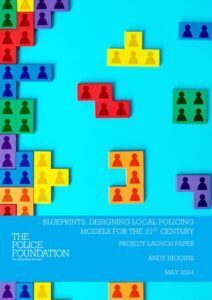
This paper marks the launch of a new research project by the Police Foundation examining the design choices made by English and Welsh police forces in delivering local policing. It takes as its starting point the large variation and frequent change in local operating models...
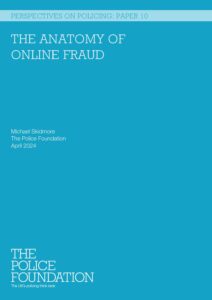
This paper reviews the available literature on fraud with the aim of unpacking the nature and particular characteristics of online fraud. It also examines how data and knowledge about fraud inform and direct the strategic and operational responses of the police and other organisations. The...

What does it mean to provide ‘better’ policing, or to improve police productivity, in the 2020s? This report seeks to address these questions by bringing together crucial insights from a conference convened by Cumberland Lodge and the Police Foundation. Getting the right things done: delivering...

Public support and approval sit at the heart of the British policing model, but recent scandals have led to an all-time low in public confidence. This report identifies six ways the technological transformation of police contact could improve public confidence. These include enabling prompt responses...

This study aims to improve our understanding of the most serious fraud offences perpetrated in the UK, specifically the diversity of methods for committing these crimes, the characteristics and pathways of offenders involved and where applicable, how the groups or networks of offenders operate. This...

‘Disruption’ is a smarter approach to controlling serious and organised crime which can be resilient to conventional methods of crime control. As the number of serious and organised crime offenders in the UK continues to grow and the internet is lowering the barriers to perpetrating...

The extent to which police powers impact on the lives, liberties and livelihoods of the communities in which policing takes place makes police accountability more fundamental than some performance measures or governance processes used for other public bodies. The principles for accountable policing evolved from...

The internet has enabled the production and consumption of child sexual abuse material on an industrial scale. It has also created new opportunities for adults to sexually abuse and exploit children. The volume of online child sexual abuse offences is now so great that it...

The UK has the reputation of having some of the safest roads in the world. Yet there is increasing evidence that they are becoming more dangerous. On average around 25,000 people are killed or seriously injured on our roads each year. Between 2010 and 2014...

This report presents the findings from a major research project by the Police Foundation and Crest Advisory on UK policing and the Covid-19 pandemic. The project examined the strengths and weaknesses of the current policing model in England and Wales, with a particular focus on...

As we emerge from a global pandemic into a very different world, the Police Foundation’s Research Director Andy Higgins says it is time to think afresh about what it means to feel safe in our local ‘places’, both metaphorically and literally. This discussion paper is...

This Police Foundation report, commissioned by the Transforming Forensics Programme, is intended to help inform the development of a new national Digital Forensics Strategy for the police service. It has two aims: first to present evidence of the potential value that could be added to...

Technology has facilitated the growth of the food delivery gig economy in London. However, in parallel, there has been a growth in moped theft and moped enabled crime in recent years, with food delivery couriers becoming a particular target. Not only can a stolen moped...

This paper looks at the implications of using police intelligence data for making decisions in prisons. It explores concerns about the accuracy of the data and the risks of bias. It also focuses on the need for transparency around how decisions are made to ensure...

Pension entitlements make up a substantial proportion of personal wealth in Britain, totalling £6.1tn in 2016-18. This is 42 per cent of aggregate household wealth, more than any other source, including property and financial savings. Around £2.5tn of this £6.1tn is accessible to scammers. Police...
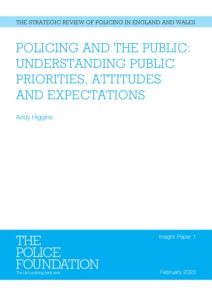
This first Insight Paper, published as part of the Strategic Review of Policing in England and Wales provides 10 key insights that can help us think about the challenge the police face in maintaining the support of the public while also meeting new threats.

The planned 20,000 uplift in police officer numbers announced in 2019 offers policing in England and Wales a once-in-a-generation opportunity to dramatically improve the diversity of its police officer workforce. With this in mind, this paper uses published Home Office police workforce data to examine...
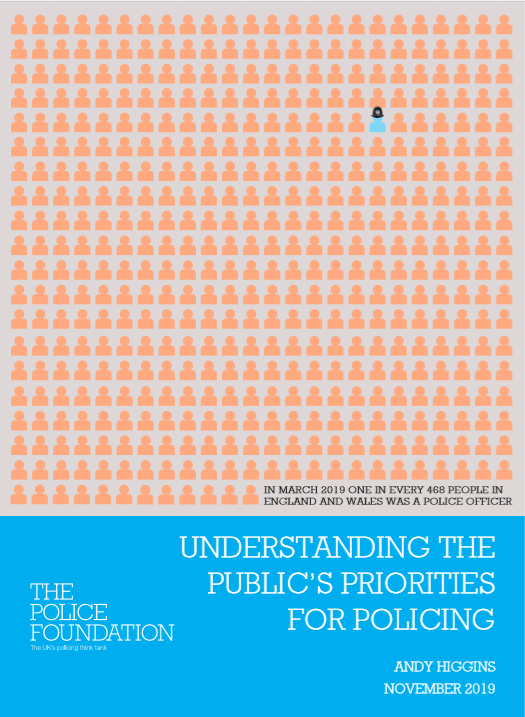
In 2019 the Police Foundation, supported by a number of Police and Crime Commissioners, undertook research to develop a deeper understanding of public attitudes towards police priorities; offering insights at both local and national levels. The project moved beyond standard opinion surveys that ask people...

This is a revised version of a paper by Auke van Dijk, Strategic Advisor, Dutch Police Service, Frank Hoogewoning, General Secretary, Police Education Council, The Hague and Maurice Punch, Senior Visiting Fellow, London School of Economics which was originally published in the Belgian-Dutch quarterly Cahiers...
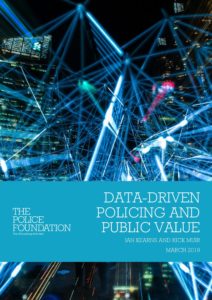
This report examines the relationship between data driven policing initiatives and the ability of the police to deliver public value. By data driven policing, we mean the current use of a wide variety of digitised data sources to inform decision making, improve processes, and increase...
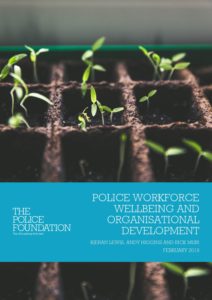
Through this study, funded by the Police Mutual Foundation, we looked at the evidence base on the field of practice known as ‘Organisational Development’ and police wellbeing. We also interviewed senior leaders and experts within policing and the wider public sector. Despite pressures on public...
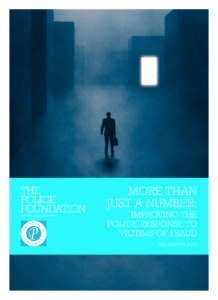
This report presents findings from the Police Foundation’s two year research project which looked at the police response to victims of fraud with Perpetuity Research. Drawing on analysis of crime data and interviews with national and local practitioners, the research examines the nature of the...
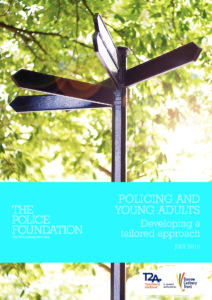
Policing young adults Young adults, defined as individuals aged 18 to 25, represent around 10 per cent of the UK population but account for a third of those sentenced to prison and 30-40 per cent of cases involving police time each year. There is a...
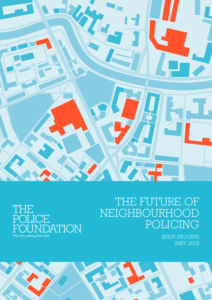
The Police Foundation’s future of neighbourhood policing project set out to bridge the gap between the end of the Neighbourhood Policing Programme in 2008 and 2025, when the Policing Vision’s proactive preventative form of local policing is realised. This study presents an investigation of how...

This paper examines whether police data on incidents of ‘sexting’ (‘youth produced sexual imagery’) can provide a reliable picture about the extent and nature of this phenomenon, including how the police service is responding. It also makes some suggestions about how the law might be...

This paper by Dr Sarah Charman presents findings from research conducted by the Institute of Criminal Justice Studies at the University of Portsmouth on new recruits’ evolving attitudes to the role of police officers in the early years of their careers and the key influences...
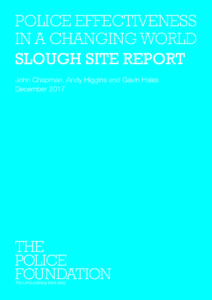
Between 2011 and 2015, the Police Foundation’s Police Effectiveness in a Changing World research team worked closely with the police and their community safety partners in Luton and Slough – two English towns that had experienced the local impact of global change particularly acutely. This...
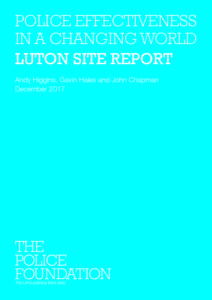
Between 2011 and 2015, the Police Foundation’s Police Effectiveness in a Changing World research team worked closely with the police and their community safety partners in Luton and Slough – two English towns that had experienced the local impact of global change particularly acutely. This...
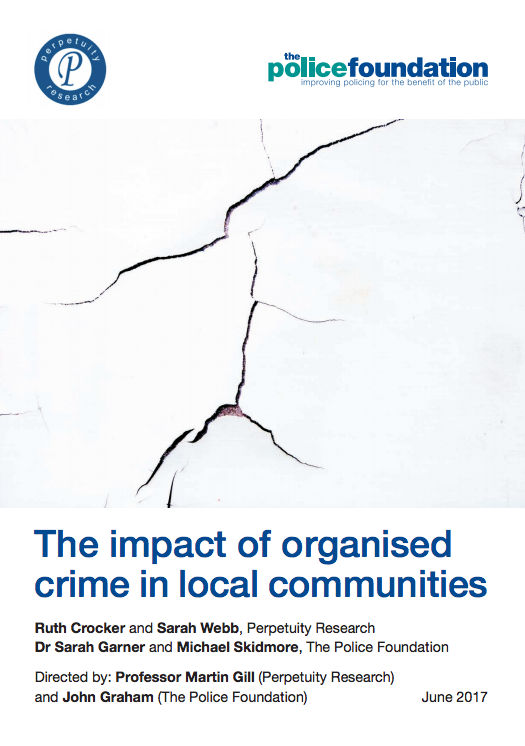
The Police Foundation and Perpetuity Research completed a two-year study which focused on understanding the impact of organised crime in local communities and how this threat is tackled locally. Some of the most harmful crimes are unacknowledged or not prioritised by the police due to low levels of...
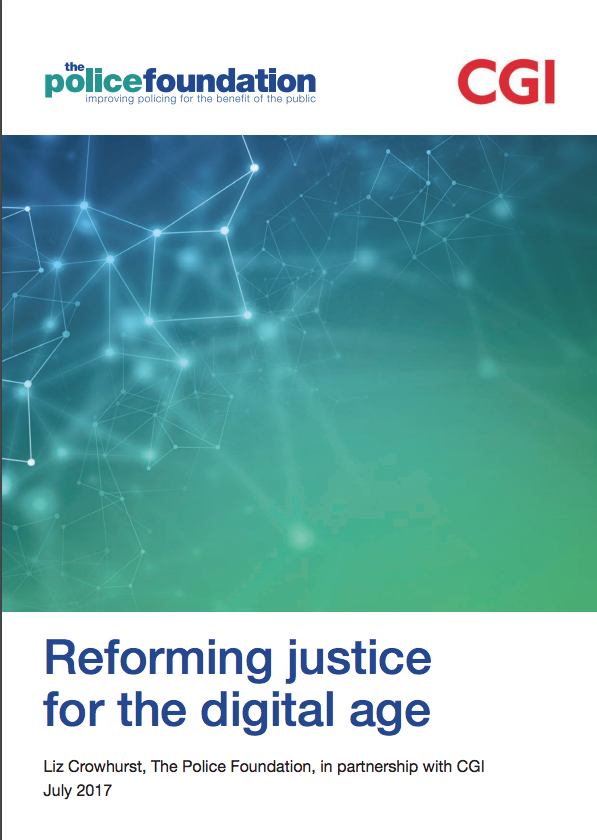
Digital justice In partnership with CGI, the Police Foundation embarked upon a project to explore how digitisation could be better harnessed by agencies across the justice system with a particular emphasis on the benefits to service-users. Through consultation with industry experts and policymakers we hoped...

The development of a Crime Severity Score for England and Wales by the Office for National Statistics represents an important step towards a more sophisticated, two dimensional understanding of police recorded crime data. In the first paper in the Perspectives on policing series Andy Higgins examines...
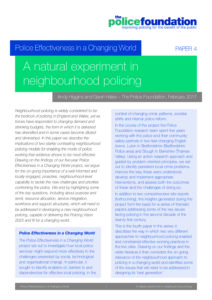
This paper brings together key learning from the Police Foundation’s Police Effectiveness in a Changing World project which examined the challenges facing the police service in a changing world and the implications for policing practice in the second decade of the twenty first century.
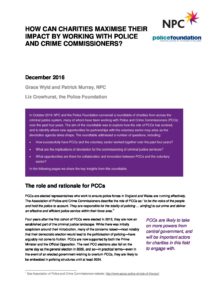
This report summarises key insights from an event hosted by NPC and the Police Foundation which explored how the role of PCC has evolved, and identified where new opportunities for partnerships with the voluntary sector may arise as the devolution agenda takes shape. The roundtable...
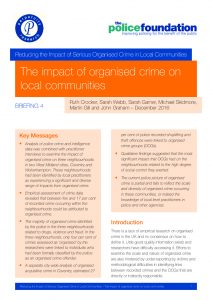
This briefing brings together key evidence from the Police Foundation’s Reducing the impact of serious organised crime in local communities project with Perpetuity Research. The two-year research project reported here attempted to arrive at a definition of organised crime and to address the lack of...
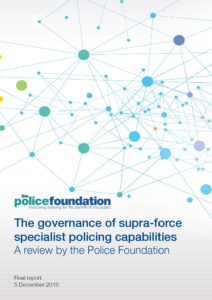
Specialist policing This research looks at how specialist policing capabilities are managed and delivered nationally through cross force collaboration. This research was commissioned by the governance working group of the Specialist Capabilities Board which is overseen by the Police Reform and Transformation Board. The research...
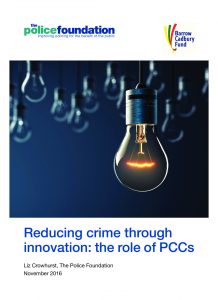
As Police and Crime Commissioners enter their second term, questions remain about what will drive further innovation to build on the reforms introduced in the first term. For many forces, obvious efficiencies have already been realised and partnerships formed, furthering the need to consider new...
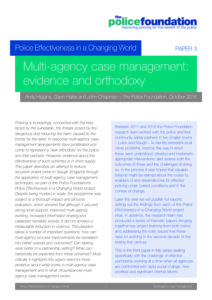
This paper brings together key learning on multi-agency case management from the Police Foundation’s Police Effectiveness in a Changing World project . The project examined the challenges facing the police service in a changing world and the implications for policing practice in the second decade...

This briefing brings together key evidence on child sexual exploitation from the Police Foundation’s Reducing the impact of serious organised crime in local communities project with Perpetuity Research. Focusing on a single city, this research examines the links between child sexual exploitation (CSE). It presents...

This report of a roundtable hosted by the Police Foundation considers the findings of a paper produced from the Police Effectiveness in a Changing World Projeect: Multi-agency case management: Evidence and orthodoxy. Participants considered what partnership working is for (reducing crime or responding to complex needs),...
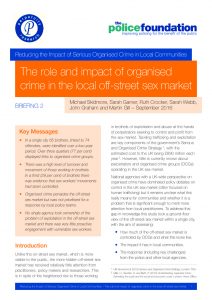
This briefing brings together key evidence on the off-street sex market from the Police Foundation’s Reducing the impact of serious organised crime in local communities project with Perpetuity Research. This study took a ‘ground-floor view’ of the off-street sex market within a single city with...
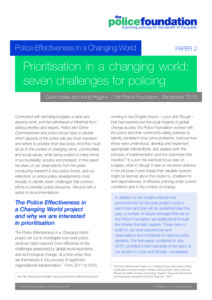
Police prioritisation in a changing world: seven challenges Through this paper we bring together what we learnt about police prioritisation from the Police Foundation’s Police Effectiveness in a Changing World project. The project examined the challenges facing the police service in a changing world and the...
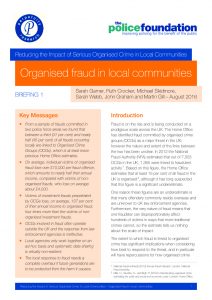
This briefing brings together key evidence on organised fraud from the Reducing the impact of serious organised crime in local communities project by the Police Foundation and Perpetuity Research. The Foundation and Perpetuity Research have attempted for the first time to measure the scale, nature...
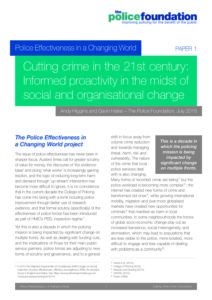
This paper brings to together key learning from the Police Foundation’s Police Effectiveness in a Changing World project, which examined the challenges facing the police service in a changing world and the implications for policing practice in the second decade of the 21st century. The...
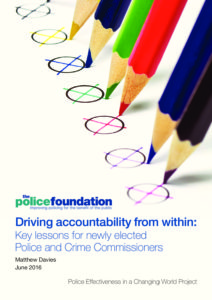
This first empirical study of Police and Crime Commissioners (PCCs) highlights a set of key findings and recommendations for newly elected PCCs to assist them in developing the internal capacity and key relationships that are essential to the challenging and expanding role. Author: Matthew Davies
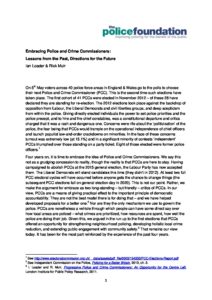
This paper argues that four years on from the first elections of Police and Crime Commissioners (PCC) in 2012 that it is time to embrace the idea of PCCs. As ‘long standing but friendly critics of PCCs’ the authors summarise the lessons learned so far,...
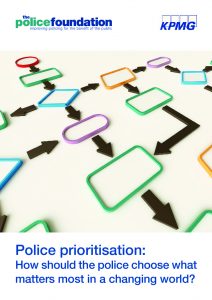
Police prioritisation has become an important matter. Previously crime-fighting was centred around reducing high volume crimes such as robbery, burglary and low level violence, but now demand has shifted to more complex offences. The police must also decide how to deal with an increase in...

Housing and crime Drawing on findings from the Police Effectiveness in a Changing World Project this research presents evidence of a growing link between crime (specifically non-domestic violence and burglary) and the poor conditions of some parts of the burgeoning private rented housing sector. The report...
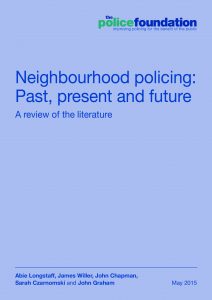
This summary of the relevant literature on neighbourhood policing was commissioned by Thames Valley Police to inform their review of the future role and function of neighbourhood policing in their force. It covers the history and development of neighbourhood policing, describes its main models, assesses...

In its first year, the College of Policing began a review to examine police leadership training and development, given the changing context in which policing is operating. It became clear that a fundamental review of police leadership was required and this mandate was taken on...

Police force collaboration: An independent review of the Warwickshire/West Mercia Strategic Alliance This independent review of the Strategic Alliance between Warwickshire and West Mercia police forces was commissioned by the Police and Crime Commissioners for both forces and was undertaken by the Police Foundation. The...

This briefing explores the history, the changes in legislation and policy, and some of the key issues associated with the policing of domestic abuse.

This Police Foundation Briefing looks at how the police use social media and examines some of the key issues.
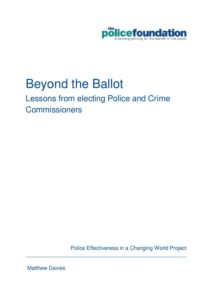
In 2012, Police and Crime Commissioners (PCCs) were directly elected by the public across England and Wales for the first time, representing a radical change to the way in which police forces are held to account. This paper explores the process of the PCC elections...
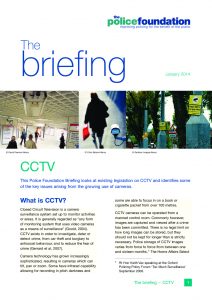
This Police Foundation Briefing looks at the legislation on CCTV and identifies some of the key issues arising from the increasing use of cameras.

The Foundation’s fourth independent inquiry examined how a new and principled framework for youth justice in England and Wales could better protect the public, while restoring confidence in a system that is often mistrusted.

Time for a new hearing Published in 2010, this report presents a comparative examination of alternative youth justice hearings and systems in the United Kingdom and other parts of the world. It concludes that the mainstream use of restorative justice in England and Wales, based...

Policing young adults: briefing for Police and Crime Commissioners A summary for Police and Crime Commissioners of the key findings and implications from the Police Foundation’s scoping study Policing young adults.
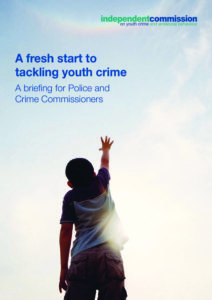
This publication draws on the findings of the Independent Commission on Youth Crime and Antisocial Behaviour, hosted by the Police Foundation. It describes how Police and Crime Commissioners can work with police forces and their partners in local government and the youth justice system to...
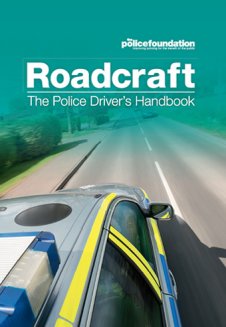
Purchase: This publication is available to buy online from the Safe Driving for Life website. Roadcraft is recognised as the definitive guide for better, safer driving. Incorporating current best practice and is used by all police forces, other emergency services, the armed forces and the general public. Produced...

This publication is available to buy online from the Safe Driving for Life website. Motorcycle Roadcraft is recognised as the definitive guide for better, safer riding. Incorporating current best practice, Motorcycle Roadcraft is used by all police forces, other emergency services and the general public. The handbook was written by the police and...
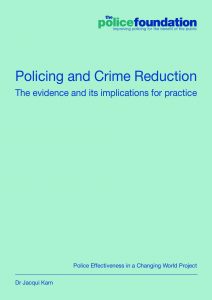
The first report from our Police Effectiveness in a Changing World project reviews the research literature on the role of the police in crime reduction, examines the challenges facing the police service in a changing world and discusses the implications for the Police Effectiveness Project,...
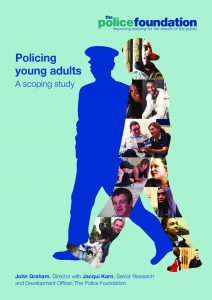
Policing young adults This report presents the findings of a scoping study on the policing of young adults with the aim of highlighting key issues and challenges and to identify an agenda for research, policy and practice. The study focuses on encounters between young adults...
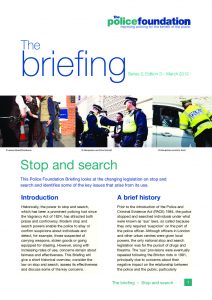
This Police Foundation Briefing looks at the changing legislation on stop and search and identifies some of the key issues that arise from its use.

This Police Foundation Briefing provides an introduction to Safer School Partnerships, examining their purpose and effectiveness. It also draws attention to some of the key issues.

This Police Foundation Briefing looks at the system for dealing with complaints against the police in England and Wales. It also discusses some of the issues relating to managing police complaints.

This Police Foundation Briefing sets out the legislation introduced to tackle antisocial behaviour, assesses some of the new measures and draws attention to the key issues.
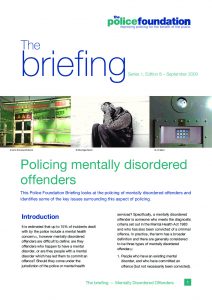
This Police Foundation Briefing looks at the policing of mentally disordered offenders and identifies some of the key issues surrounding this aspect of policing.
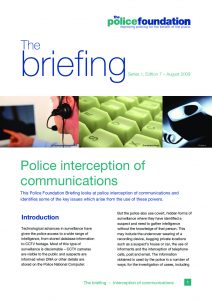
This Police Foundation Briefing looks at police interception of communications and identifies some of the key issues that arise from the use of these powers.
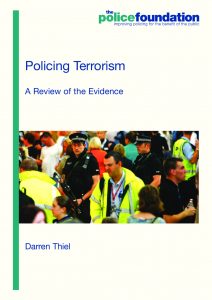
Policing terrorism: A review of the evidence This review aims to identify what is known and what is not known about contemporary terrorism and considers how to improve the exchange of information and intelligence between communities, local police and security services. The review also assesses...
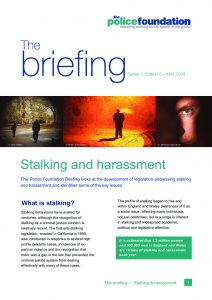
This Police Foundation Briefing looks at the development of legislation addressing stalking and harassment and identifies some of the key issues.
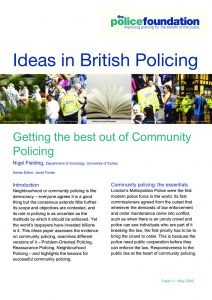
This paper assesses the evidence on community policing, examines different versions of it and highlights the lessons for successful policing of communities. Author: Nigel Fielding
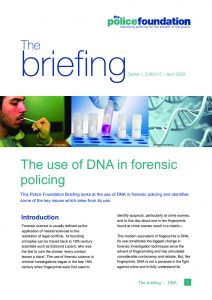
This Police Foundation Briefing looks at the use of DNA in forensic policing. It also identifies some of the key issues that arise from its use.
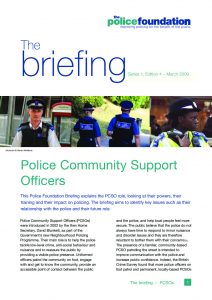
This Police Foundation Briefing explains the PCSO role, looking at their powers, their training and their impact on policing. It also identifies key issues such as their relationship with the police and their future role.
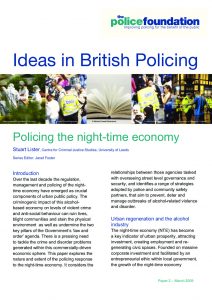
This paper explores the policing response to the night time economy and considers the relationship between those agencies that oversee street level governance and security. It identifies a range of strategies for responding to alcohol related violence and disorder when policing the night time economy....

This Police Foundation Briefing looks at the developments in the use of Tasers in the UK and abroad, and highlights some of the key arguments for and against the device.
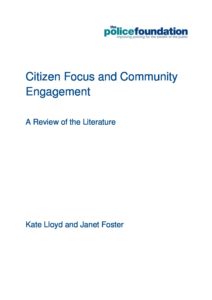
Despite receiving higher public ratings than other criminal justice professionals, public confidence in the police has declined significantly in the last 25 years. Research on policing and community engagement suggests that dissatisfaction with the police is related to how people are treated, not the role...

This paper explores some basic principles for policing violent places to aid police in the identification of the most serious problems any local area. These principles also offer an approach to the proactive policing of the people and places causing harm to local communities that...
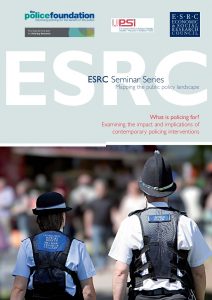
The Police Foundation, together with the Scottish Institute for Policing Research (SIPR) and the Universities’ Police Science Institute at Cardiff University hosted a series of public policy seminars, funded by the Economic and Social Research Council (ESRC) entitled ‘What is policing for?’ The seminars considered...
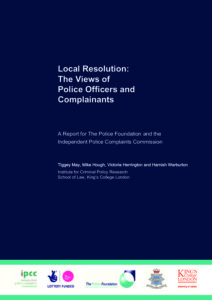
This report examines the views of officers and complainants on the Local Resolution procedure, and assesses the impact of innovative approaches implemented in Cleveland and West Mercia constabularies which aimed to improve officer and complainant understanding and satisfaction with the Local Resolution procedure.
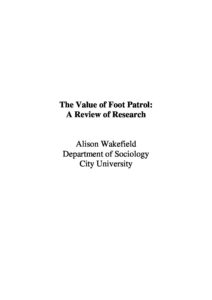
The Police Foundation conducted an evaluation of community policing initiatives prior to the Home Office’s introduction of Neighbourhood Policing Teams. This report assesses current evidence to explore whether foot patrol can meet the high expectations of citizens and policy makers. Specifically, it addresses the following...
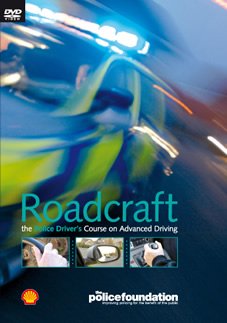
Purchase: This publication is available to buy online from the TSO Shop. Ideally suited to any driver who wishes to improve their driving skills and safety record, this DVD tracks police candidates on an advanced driving course run at the Metropolitan Police Driving School, Hendon. Expert tutors...
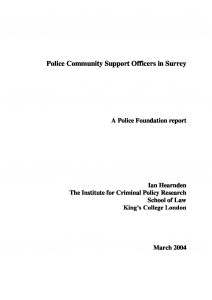
Police Community Support Officers in Surrey This report was produced for the Police Foundation by the Institute of Criminal Policy Research, King’s College London. It presents an evaluation of Surrey Police’s first intake of Police Community Support Officers (PCSOs). The report offers a series of...
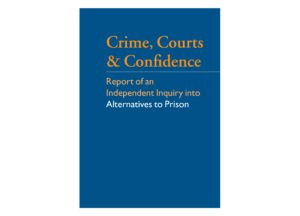
This report is from an Independent Inquiry which looked at alternatives to prison. The Inquiry was hosted by the Esmee Fairbairn Foundation as part of its Rethinking Crime and Punishment project. The Police Foundation supported the Inquiry by providing research and administrative support. Chaired by...
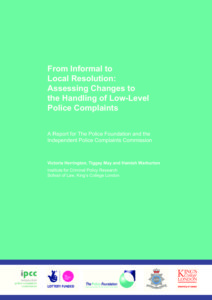
This report presents the findings from a study of the current administrative arrangements for Local Resolution across police forces in England and Wales from the perspective of those managing the procedure. It also quantifies the extent of change and variation since Local Resolution replaced Informal...

This report presents the findings of the first phase of the Police Foundation’s study on the Informal Resolution of police complaints. It examines the Informal Resolution process from the perspectives of those involved in the implementation of complaints procedures. It also briefly assesses the views...
Hotspotting provides an account of a project which turned crime hotspotting theory into practice in Northumbria and Thames Valley. Police teams in both forces were charged with reducing public calls for the service by applying problem-oriented policing theory and methods. The report explores how hot spots were identified and located,...

Fleetcraft: The Essential Occupational Driver’s Handbook This publication is available to buy online from the TSO Shop. This is the authoritative guide for the occupational driver, and is the first affordable risk management solution aimed to assist responsible companies to meet their health and safety obligations and reduce the...

This publication is available to buy online from the TSO Shop. The definitive guide to towing in the UK. The book covers the legal requirements; equipment; types of trailer; driving with a tow; adverse weather conditions; road types and surfaces; and servicing and maintenance. Author: Philip Coyne...
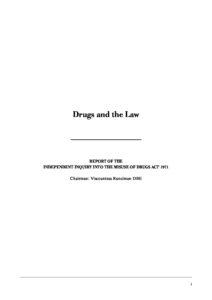
This report is from the Police Foundation’s Independent Inquiry into Drugs and the Law. Members of the inquiry looked at the changes that had taken place in society since the Misuse of Drugs Act 1971 was passed. It also considered whether the law should be...

This report is from the Police Foundation’s first Independent Inquiry which was set up in collaboration with the Policy Studies Institute. It arose out of a concern that too little thought was being given to what the fundamental role and responsibilities of the police are....
